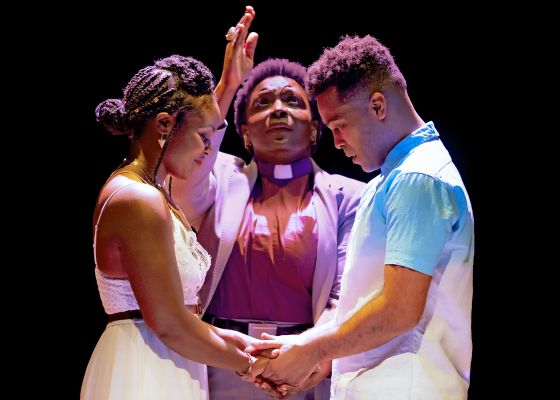
Although tribal enmity dating from 1957 could, in 2019, plausibly be labeled an "ancient grudge" let's make it clear from the start: The warring Veronese neighbors we meet in this production of Romeo and Juliet are not the descendants of the Jets and Sharks, bent on reviving old quarrels rooted in long-forgotten slights. Neither are we to assume from the architecture of the Capulet's vacation house, with its spacious back-yard patio and proximity to boulder-strewn northern beaches, or from the unaccented locution of its residents (vocalized in short bursts replete with flattened "a"s, nasalized "e"s and hard "r"s, rather than the spoken-word arias we associate with Elizabethan drama) that the locale of our story is within the environs of Cape Cod, or the Indiana Dunes, for that matter. Director Barbara Gaines clearly states in her playbill notes, after all, that Shakespeare's tragic tale of communal disintegration arising from the legacy of violence imposed upon credulous children by parents unwilling to break with ancestral ties, can occur in "any town torn apart … by all that divides us.” To emphasize the global relevance of her parable, Gaines has cast across ethnic and gender lines—e.g. Friar Lawrence (whose church now displays a Protestant altar) is now played by African-American female actor Darlene Hope—and instructed her designers to adopt a visual palette blending vivid tropical hues and subdued preppy tints, and to swaddle the lovers in soft disco-era dance music, while searing the adolescent bro's in harsh LED chiaroscuro. This conceptual immediacy is further underlined by a text not re-edited, so much as rescored, in order to highlight phrases often muted, if not excised completely. The initiators of the brawl that begins the play, for example, are now the elderly Capulet and Montague patriarchs, whose kin are forced to join in the melee, despite the protests of their wives at these juvenile antics. (Those spouses, by the way, have more to say in this contemporary setting, commandeering speeches originally consigned by the author to their male counterparts). Romeo's crew—volatile Mercutio (portrayed as a military veteran prone to bouts of PTSD), badass Tybalt, and effete Paris are likewise granted hints of backstory. Such analogies can only be extended so far toward spanning four centuries, of course, and while the familiarity of Gaines's characterizations endows the filial bickering with the congenial tone of a television comedy during the first act, this levity cannot be sustained over the second, making for an increasing reliance on straightforward classical declamation. The final word—delivered this time by the ever-mediatory Benvolio—is an exhortation to peaceful reconciliation sealed, not only in verbal acquiescence, but in action.
